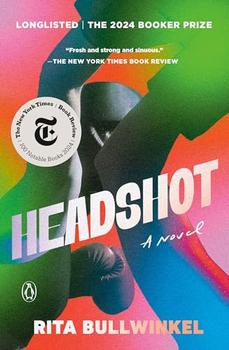Summary | Excerpt | Reviews | Beyond the book | Read-Alikes | Genres & Themes | Author Bio

A Novel
by Rita BullwinkelAnyone who's participated in, or even attended, a sports tournament knows about the intensity of that concentrated frame of competition; for a period of hours or days, time ceases to exist. All that matters is what's happening on the court, on the field, or—in the case of Rita Bullwinkel's debut novel, Headshot—in the ring. Set amid the glow of the fluorescent lights of Bob's Boxing Palace (a converted warehouse) in Reno, Nevada, Headshot recounts the drama that is the 12th Annual Daughters of America Cup, pitting eight of the country's best 18 and under girl boxers against one another over two days in July.
Some of the boxers—like the seemingly prophetically named Artemis Victor (the youngest of the three champion Victor sisters)—are favored to win, while others are longshots at best. Some have family members among the paltry crowd of onlookers while others drove to Reno alone from as far away as Florida, Texas, and New Mexico.
The novel is structured like a tournament—in a series of bouts between rival boxers, beginning with the semifinals and culminating with the ultimate match. Bullwinkel is an accomplished writer of short fiction, and each of these bouts reads much like a short story, one in which characters' past and future selves revolve around the turning point of the present moment, where the only thing that exists is the body and its physical, violent relationship to another body. The narration, which unfolds without a single line of dialogue, also vividly demonstrates the relationship between mind and body, as each character's lived experience swirls around these bloody battles in the ring.
Andi Taylor, who meets Artemis Victor in the opening match, is haunted by a tragedy from her recent past. Kate Heffer finds mental stillness and focus by reciting the digits of pi. Her first-round opponent, Rachel Doricko, throws her combatants off-kilter by adopting an unsettling persona (including donning a Daniel Boone-style hat when she's not in the ring). Rose Mueller boxes to overcome a traumatic bullying experience, while Tanya Maw boxes to forget—at least for a few minutes at a time—the mother who abandoned her. Bullwinkel also grants readers glimpses of each girl's future, years or decades after she's quit boxing, in which these brief moments in the ring are a minor footnote or the pinnacle of achievement.
The girls' stories, as well as the past and the future, collapse into one another, expanding and contracting continually over the course of the novel. And that's kind of the crux of it all; as the narrative notes at one point, "If you stand in the middle of the ring you can send your mind up through the hole of the worlds built by the other girl boxers. You can travel through the layers of different imagined futures, and the different ways each girl has of being." This technique, this constant shifting of viewpoints and timeframes, has the effect of making the narrative feel simultaneously immediate and timeless, both intimate and expansive. These characters are at once intensely specific and universal.
Bullwinkel plays with preconceptions about gender and femininity, stressing each boxer's physicality, strength, and size while also showing how they actively resist categorization: "What a sad thing, to be a good girl ... mountains and mountains worse than good boy. There can't be a single girl in here who wants to be just fine." She shows the fragility of the line between good-natured but ribald playground hand-clapping rhymes and the aggression and release these girls pursue in the ring. In doing so, she vividly and viscerally interrogates preexisting notions of girlhood, of appropriate kinds of play, and of every girl's possible future.
![]() This review was originally published in The BookBrowse Review in March 2024, and has been updated for the
April 2025 edition.
Click here to go to this issue.
This review was originally published in The BookBrowse Review in March 2024, and has been updated for the
April 2025 edition.
Click here to go to this issue.

If you liked Headshot, try these:

by Lucas Schaefer
Published 2025
For readers of Jonathan Franzen and Nathan Hill comes a haymaker of an American novel about a missing teenage boy, cases of fluid and mistaken identity, and the transformative power of boxing.

by Asale Angel-Ajani
Published 2024
A stunning debut novel following the turbulent relationship of a Black, biracial teen and her ferocious Russian mother, struggling to survive in the California desert.
Your guide toexceptional books
BookBrowse seeks out and recommends the best in contemporary fiction and nonfiction—books that not only engage and entertain but also deepen our understanding of ourselves and the world around us.